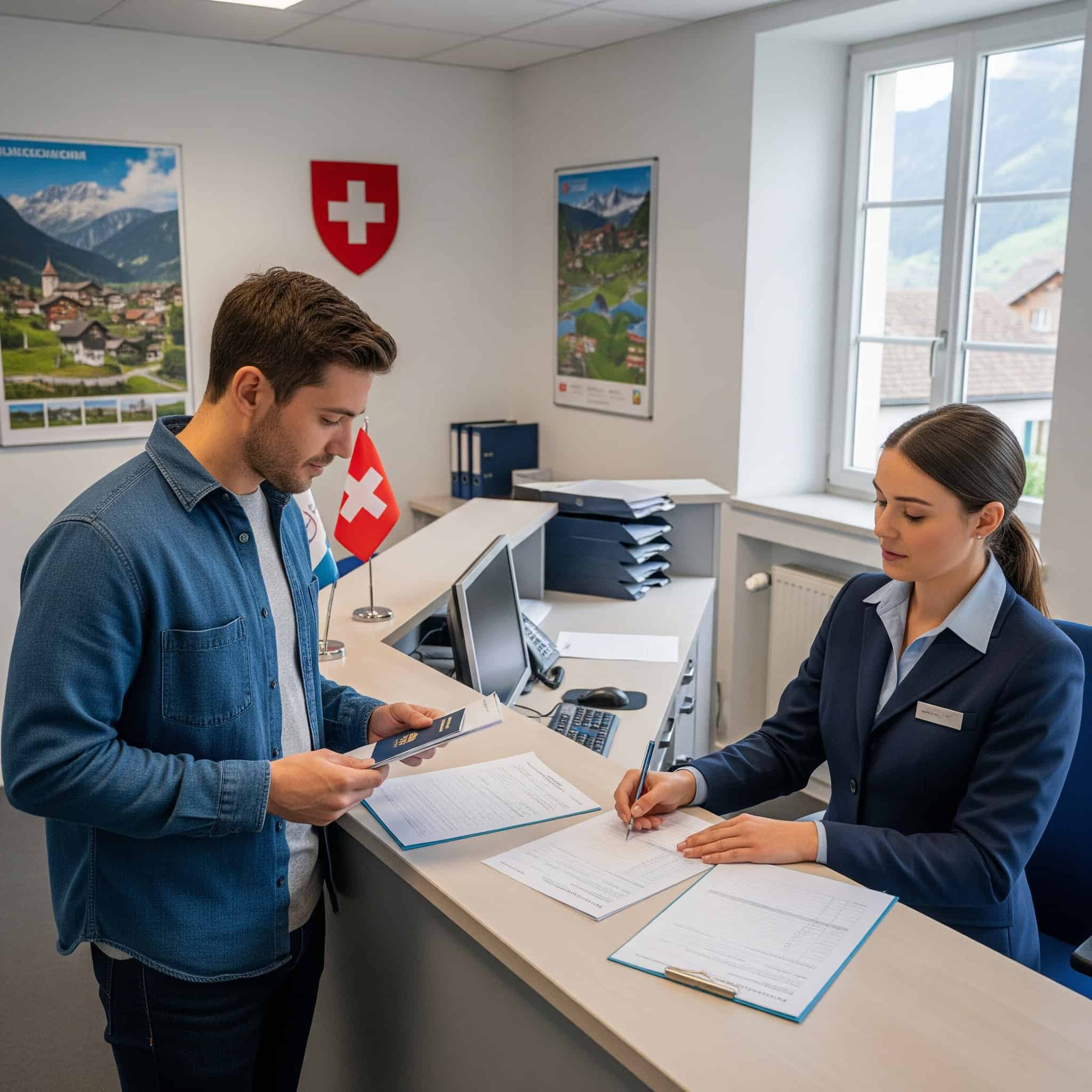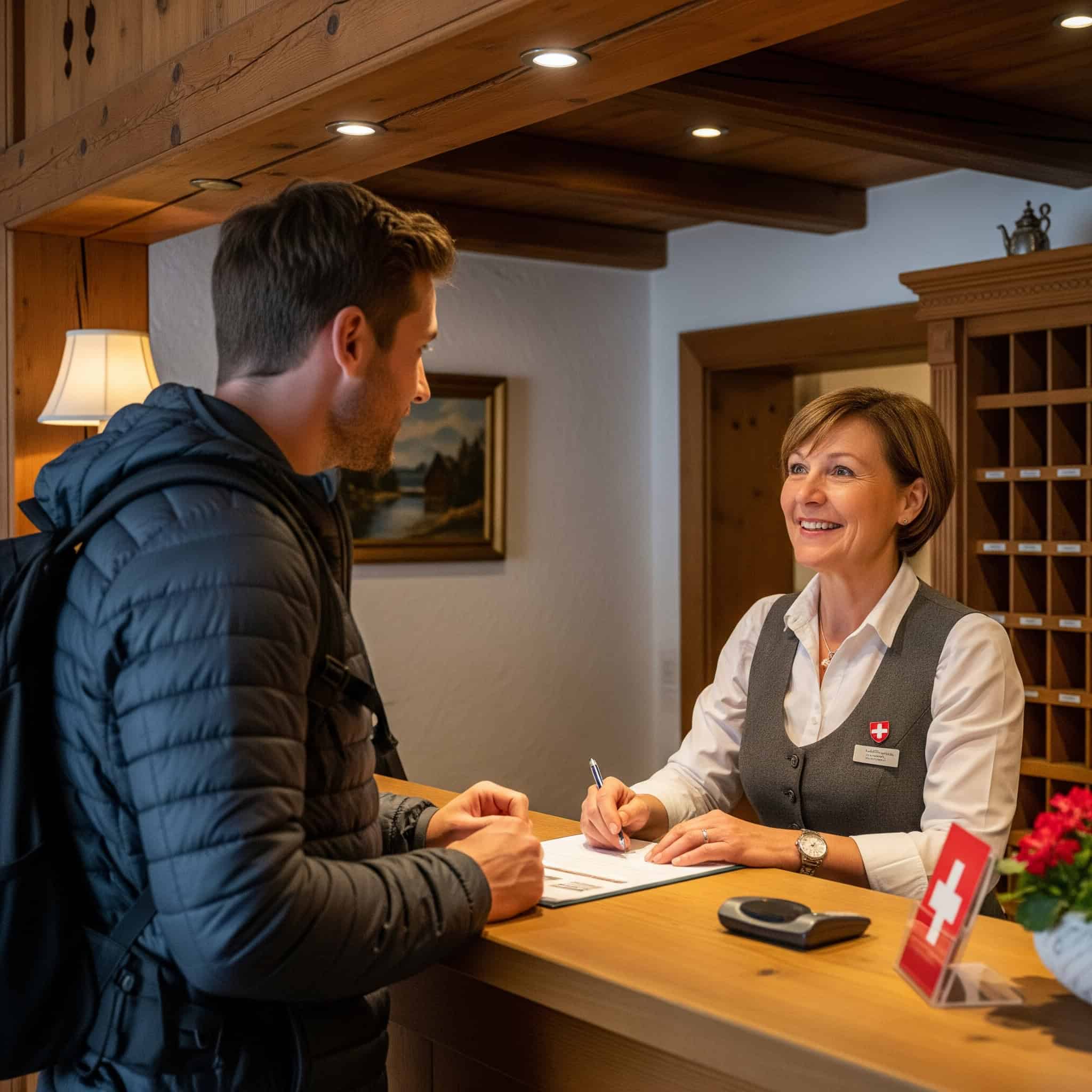Moving to Switzerland from the US: 25 Essential Considerations for a Smooth Transition
According to recent data from the Swiss Federal Statistical Office, over 20,000 Americans currently reside in Switzerland, with numbers increasing by approximately 3% annually. I remember when I first considered moving to Switzerland – the mix of excitement and overwhelming details made the process seem daunting. Whether you’re relocating for work, education, or lifestyle reasons, this comprehensive guide breaks down the 25 most important considerations to help you navigate your move from the US to Switzerland successfully.
Table of Contents
Immigration and Legal Requirements
Visa and Permit Options
Registration Requirements
Residency Timeline and Permanent Status
Driver’s License Conversion
Pet Relocation Requirements
Financial Considerations
Banking Setup
Cost of Living Adjustments
Tax Obligations
Retirement and Pension Planning
Health Insurance Requirements
Housing and Relocation
Finding Accommodation
Relocation Services
Shipping and Storage Solutions
Temporary Housing Options
Utility Setup and Services
Cultural and Practical Adaptation
Language Learning Resources
Cultural Integration Programs
Expatriate Communities
Public Transportation System
Healthcare Navigation
Employment and Education
Job Market Navigation
Credential Recognition
Entrepreneurship and Self-Employment Options
Educational System for Children
Higher Education Opportunities
Pre-Move Preparation with Jiffy Junk
Final Thoughts
Immigration and Legal Requirements
1. Visa and Permit Options
Navigating Swiss immigration requires understanding the specific permit that matches your situation. As an American, you’ll need proper authorization through work permits, student visas, family reunification, or retirement options. The B permit (residence permit) is most common for employed expatriates, initially valid for one year and renewable based on your employment status. Be aware that Switzerland maintains a strict quota system for non-EU citizens, making the process competitive.
Swiss immigration operates on a dual system that prioritizes EU/EFTA nationals, with limited quotas for US citizens that reset annually in January. These quotas often deplete quickly for in-demand regions like Zurich or Geneva, so timing your application right can make all the difference in how to move to Switzerland successfully.
Work permits typically require employer sponsorship with proof that no qualified Swiss or EU candidate could fill the position. This means you’ll need extensive documentation of your specialized skills or qualifications to stand out in the application process. I’ve seen many Americans surprised by how rigorous this evaluation can be.
Permit Type | Purpose | Duration | Key Requirements |
|---|---|---|---|
B Permit | Work/Employment | 1 year (renewable) | Job contract, employer sponsorship |
L Permit | Short-term work | 12-24 months | Temporary job contract |
G Permit | Cross-border commuter | 5 years (renewable) | Live in neighboring country, work in Switzerland |
C Permit | Permanent residence | Indefinite | 5-10 years of continuous residence |
Student Visa | Education | Duration of program | Acceptance to Swiss institution, financial proof |
2. Registration Requirements
Upon arrival in Switzerland, you must register with local authorities within 14 days. This process involves visiting your local Gemeinde (municipality office) with your passport, visa, rental agreement, and photos. This requirement is strictly enforced, and failure to comply can result in fines or complications with your legal status in Switzerland.
Registration procedures vary by canton, with some requiring appointments while others operate on a walk-in basis. Documentation requirements may include birth certificates, marriage certificates, and proof of health insurance. I found this process surprisingly formal compared to the US system.
The registration process initiates your tax obligations and connects you to the Swiss social security system (AHV/AVS), generating your personal identification number used for all official interactions. This number becomes your Swiss identity in many ways, used for everything from opening bank accounts to receiving medical care.
When Sarah moved to Zurich from Boston, she scheduled her registration appointment online through the city’s portal two weeks before arrival. At her appointment, she brought her passport with D-visa, signed rental contract, two passport photos, and proof of health insurance. The process took 45 minutes, during which she received her residence permit card, AHV number for social security, and information packet about local services. She was surprised that she needed to pay a registration fee of CHF 120 on the spot, which wasn’t mentioned in her research. The official also explained that she would need to deregister in person if she moved to another canton or left Switzerland.
3. Residency Timeline and Permanent Status
Understanding the path from temporary to permanent residency helps with long-term planning. Typically, after 10 years of continuous residency, Americans can apply for a C permit (permanent residency) or Swiss citizenship. This timeline can be shortened based on factors such as integration efforts, language proficiency, and marriage to a Swiss citizen.
The C permit application requires proving B2 level proficiency in your canton’s official language, financial independence, respect for Swiss law, and integration into Swiss society. This isn’t just a formality – you’ll need to demonstrate genuine connections to your local community and understanding of Swiss culture.
Citizenship applications involve federal, cantonal, and communal approval processes, with requirements including 10 years of residence (years between ages 8-18 count double), no welfare dependency, and passing tests on Swiss geography, history, and political system. Living in Switzerland long-term means embracing these milestones as part of your journey.
4. Driver’s License Conversion
Americans must convert their US driver’s license to a Swiss one within 12 months of arrival. The process varies by canton but generally requires an application, eye test, and sometimes a practical driving test. Some cantons have stricter testing requirements for Americans than others, so research your specific canton’s rules early. Before relocating, you might need to clear out your current home. Our guide to decluttering can help you determine what to bring and what to discard before your international move.
License conversion requirements depend on reciprocity agreements between Switzerland and specific US states. Some states’ licenses qualify for direct exchange while others require full theoretical and practical examinations. I was fortunate that my state had a reciprocity agreement, saving me significant time and stress.
The Swiss driving system includes mandatory first-aid courses and special certifications for different vehicle categories, with licenses renewed every 5 years after age 50 and requiring medical examinations after 75. This reflects Switzerland’s emphasis on safety and ongoing driver competence throughout life.
5. Pet Relocation Requirements
Bringing pets to Switzerland involves strict regulations. Your pets will need microchips, rabies vaccinations, EU pet passports, and sometimes quarantine periods. Planning for pet relocation should begin months before your move to ensure compliance with all veterinary requirements and avoid complications at the border.
Switzerland follows EU pet import regulations requiring ISO-standard microchips implanted before rabies vaccination, with vaccinations administered at least 21 days before entry and documented in an EU Pet Passport. This timeline is non-negotiable, so start early if you’re bringing furry family members.
Certain dog breeds face cantonal restrictions or bans, and all dogs must be registered with the local authorities within 10 days of arrival, with mandatory liability insurance and sometimes breed-specific requirements. My neighbor discovered this when bringing her American Staffordshire Terrier – she needed special permission and additional insurance coverage.
Financial Considerations
6. Banking Setup
Establishing a Swiss bank account is essential but can be complex for Americans due to FATCA regulations. Major banks like UBS and Credit Suisse have specific departments for US clients, though they may charge higher fees. FATCA reporting requirements make some Swiss banks reluctant to work with American clients, so thorough research is necessary before arrival.
Swiss banks offering services to US persons must comply with FATCA reporting requirements, requiring additional documentation including W-9 forms and consent to information sharing with the IRS. This creates extra paperwork and sometimes higher fees for American moving to Switzerland compared to other nationalities.
Banking options for Americans include specialized expatriate accounts with international banks, cantonal banks with US-person programs, and digital banking platforms, each with different fee structures and minimum balance requirements. I found that smaller cantonal banks were often more accommodating and charged lower fees than the major international banks.
7. Cost of Living Adjustments
Preparing for Switzerland’s high living expenses requires careful financial planning. Monthly expenses for a single person can easily exceed CHF 3,500-4,500 ($3,800-4,900) in cities like Zurich or Geneva. While salaries are typically higher in Switzerland, you should ensure your income will support the increased cost of living before making the move.
Cost disparities include groceries costing 60-120% more than US equivalents, with restaurant meals averaging CHF 25-40 for lunch and CHF 40-70 for dinner in urban areas. The first time I went grocery shopping in Zurich, I nearly fell over seeing the price of basic items like chicken breast and cereal!
Housing represents the largest expense, consuming 25-35% of the average household budget, with mandatory expenses like health insurance, transportation, and taxes accounting for another 30-40%. Living in Switzerland means accepting these higher costs as part of the trade-off for excellent infrastructure, safety, and quality of life.
Expense Category | Average Monthly Cost (CHF) | Comparison to US |
|---|---|---|
Housing (1BR apartment) | 1,500-2,500 in cities | 80-150% higher |
Health Insurance | 300-600 per adult | System differs completely |
Groceries | 400-800 | 60-120% higher |
Public Transportation | 70-250 | Often replaces car costs |
Dining Out | 500-1,000 | 40-100% higher |
Utilities & Communications | 200-400 | Similar to US |
Entertainment | 200-500 | 20-50% higher |
8. Tax Obligations
Understanding dual taxation issues between the US and Switzerland is crucial for financial planning. Americans must file US taxes annually regardless of residence, though the Foreign Earned Income Exclusion may apply to income up to approximately $120,000 (varies yearly). Switzerland has a three-tiered tax system (federal, cantonal, and municipal), and rates vary significantly by location. When planning your move abroad, you’ll need to consider what to do with your current belongings. Our article on how to get rid of clutter provides valuable strategies for deciding what to keep, donate, or dispose of before your international relocation.
The US-Switzerland tax treaty prevents double taxation through foreign tax credits and exclusions, but Americans must still file FBAR reports for foreign accounts exceeding $10,000 and FATCA Form 8938 for foreign assets above threshold amounts. This creates an ongoing administrative burden that many Americans don’t anticipate.
Swiss tax rates vary dramatically by canton, with some like Zug and Schwyz offering rates below 25% for high incomes while others like Geneva can exceed 45%, making canton selection a significant financial consideration. I’ve met several Americans who specifically chose their canton based on tax advantages, particularly entrepreneurs and high-income professionals.
9. Retirement and Pension Planning
Navigating Swiss pension requirements and US Social Security implications requires forward thinking. The Swiss system includes mandatory occupational pension funds where both employers and employees contribute. Americans should understand how their Swiss pension contributions affect their US Social Security benefits and overall retirement planning to avoid surprises later.
The Swiss pension system operates on three pillars: state pension (AHV/AVS), occupational pension (BVG/LPP), and private savings, with the first two being mandatory and deducted automatically from salaries. This structured approach provides excellent retirement security but differs significantly from the US 401(k)-centered system.
Totalization agreements between the US and Switzerland prevent dual social security taxation and allow for benefit coordination, but withdrawal options for pension funds upon permanent departure have specific tax implications requiring professional guidance. Living in Switzerland means adapting to this more structured pension approach, which many Americans find provides greater long-term security.
10. Health Insurance Requirements
Switzerland requires mandatory private health insurance within three months of arrival. Basic health insurance (Grundversicherung/Assurance-maladie de base) costs approximately CHF 300-600 ($330-660) monthly per adult. Unlike the US, Swiss health insurance is not typically provided by employers and includes deductibles and co-pays that you’ll need to budget for.
Basic insurance covers standardized services across all providers, but premiums vary based on canton, age, and deductible choice (ranging from CHF 300-2,500 annually), with higher deductibles reducing monthly premiums. I opted for a higher deductible since I rarely need medical care, saving about CHF 100 monthly on premiums.
Supplementary insurance options cover additional services like private hospital rooms, alternative medicine, and dental care, but insurers can reject applicants based on pre-existing conditions, unlike with basic insurance. This two-tier system provides universal coverage while allowing for personalized options.
Housing and Relocation
11. Finding Accommodation
Navigating Switzerland’s competitive housing market requires preparation and patience. Rental applications often require extensive documentation including employment contracts, credit reports, and references. Housing in popular areas can be extremely competitive, with dozens of applicants for each property, so starting your search early is essential for securing suitable accommodation.
The Swiss rental market operates with standard 3-month notice periods and quarterly moving dates (typically March 31, June 30, September 30, and December 31), creating cyclical availability patterns. This structured approach means planning your arrival around these dates can significantly improve your housing options.
Rental applications typically require an extract from the debt collection register (Betreibungsregisterauszug), proof of income showing rent doesn’t exceed 30% of gross salary, and security deposits of 2-3 months’ rent held in escrow accounts. The formality of this process often surprises Americans used to more casual rental arrangements. I found that having a Swiss guarantor made a huge difference in my application success rate when I first arrived to live in Switzerland.
Michael, a software engineer relocating to Basel, began his apartment search three months before his planned move. He initially focused on online listings through Homegate and ImmoScout24, but quickly learned that responding to ads wasn’t enough in the competitive market. After several rejected applications, he engaged a relocation agent who had access to properties before they were publicly listed. The agent arranged five viewings in one day, advised him on strengthening his application package with a personal introduction letter and employer reference, and helped negotiate with landlords. Within two weeks, Michael secured a two-bedroom apartment in the Gundeli neighborhood, paying a security deposit of CHF 4,500 (three months’ rent) into an escrow account. The relocation agent’s fee of CHF 2,000 proved worthwhile given the difficulty of securing housing remotely and navigating the complex application process.
12. Relocation Services
Professional assistance can create a smoother transition to Swiss life. Full-service relocation companies can handle everything from visa applications to housing searches and school enrollment for approximately CHF 5,000-10,000 ($5,500-11,000). Many employers offer relocation packages for international transfers, which can significantly reduce these costs and streamline the process. Before your international move, you’ll likely need to dispose of furniture that won’t make the journey. Our furniture removal guide provides tips on responsibly disposing of items you won’t be taking to Switzerland.
Comprehensive relocation services typically include pre-departure consultation, immigration assistance, home-finding tours, school placement, settling-in services, and cultural orientation programs tailored to specific cantons. For families or busy professionals, these services can save countless hours of research and frustration.
Destination Service Providers (DSPs) offer modular services priced individually, allowing customization based on needs, with home-finding services averaging CHF 2,000-3,500 and immigration support ranging from CHF 1,500-4,000 depending on complexity. I initially balked at these costs but later realized their value after struggling with some aspects of the move on my own.
13. Shipping and Storage Solutions
Moving household goods internationally requires careful planning. A full container shipment from the US to Switzerland typically costs $5,000-12,000 depending on volume and service level. Consider whether to ship all belongings or purchase new items in Switzerland, as some US appliances won’t work with Swiss electrical systems (220V/50Hz).
International shipments to Switzerland require detailed inventories in French, German, or Italian for customs clearance, with duty-free import available for used personal effects if you complete a “Declaration/Application for clearance of removal goods” form. This paperwork must be precise – customs officials can and do inspect shipments thoroughly.
Shipping timelines typically include 3-6 weeks for sea freight plus 2-3 weeks for customs clearance, with air freight options available at 3-4 times the cost but reducing transit time to 1-2 weeks. When moving from US to Switzerland, I underestimated how long I’d be without my belongings and wish I’d packed a more comprehensive “essentials” suitcase for the interim period.
14. Temporary Housing Options
Short-term accommodations provide flexibility while finding permanent housing. Serviced apartments in Zurich start at approximately CHF 3,000 ($3,300) monthly for a one-bedroom unit. Temporary housing allows time to explore different neighborhoods before committing to a long-term rental, which is particularly valuable in a new country. When preparing for your international move, you might need to clear out an entire property. Our bulk junk removal guide offers strategies for efficiently handling large-scale cleanouts before relocating to Switzerland.
Temporary housing options include apart-hotels with flexible lease terms (minimum 7 days to 3 months), sublets through platforms like Wunderflats or Homelike, and corporate housing arrangements through relocation providers. These furnished options typically include utilities and internet, making your initial transition smoother.
Short-term rentals typically include utilities, internet, and weekly cleaning services, but often require VAT (7.7%) on stays under 3 months, increasing effective costs beyond advertised rates. Despite the premium price, I found temporary housing invaluable for getting my bearings and making an informed decision about where to settle permanently.
15. Utility Setup and Services
Establishing essential services in your new home involves several steps. Services like electricity, water, internet, and mandatory TV/radio fees (Serafe) must be arranged separately. Some utilities are building-wide and included in common charges, while others require individual contracts that you’ll need to set up upon arrival.
Utility providers operate as regional monopolies for electricity, water, and gas, with registration typically handled through municipal websites, while telecommunications services offer competitive options including Swisscom, Sunrise, Salt, and UPC. The monopoly structure means you can’t shop around for better electricity rates, but service quality is consistently high.
The mandatory Serafe media fee (CHF 335 annually per household) funds public broadcasting and applies regardless of whether you own reception devices, with few exemption possibilities. This fee often surprises Americans, who are used to optional cable and streaming services rather than mandatory media taxes.
Cultural and Practical Adaptation
16. Language Learning Resources
Acquiring necessary language skills facilitates integration into Swiss society. Intensive German/French/Italian courses at language schools like Migros Klubschule cost approximately CHF 500-1,000 ($550-1,100) per level. While many Swiss speak English, learning the local language significantly improves integration and employment opportunities in your new community.
Language learning approaches include intensive courses (20+ hours weekly), extensive courses (2-6 hours weekly), private tutoring (CHF 60-120 per hour), and government-subsidized integration courses available through cantonal immigration offices. The right approach depends on your learning style, schedule, and budget.
Language certificates like TELC, Goethe-Institut (German), DELF/DALF (French), or CELI (Italian) provide officially recognized proof of proficiency required for permanent residency and citizenship applications. I found that combining formal classes with language exchange meetups accelerated my progress and helped me build local friendships simultaneously.
17. Cultural Integration Programs
Resources to help Americans adapt to Swiss culture are widely available. Many communities offer integration courses covering Swiss customs, social norms, and practical information. Understanding cultural nuances like punctuality, recycling rules, and quiet hours is essential for harmonious living in Switzerland and avoiding unintentional social missteps.
Government-sponsored integration programs include “In Switzerland” courses covering political systems, healthcare, education, and cultural norms, often subsidized for residence permit holders. These programs provide structured guidance on navigating Swiss society and institutions.
Integration expectations include respecting unwritten rules like no laundry or showering after 10 PM, no lawn mowing on Sundays, greeting neighbors, and participating in building cleaning rotations (Putzplan) in shared housing. These seemingly small details can significantly impact how you’re perceived by Swiss neighbors and colleagues.
Swiss Cultural Norm | American Difference | Adaptation Strategy |
|---|---|---|
Strict quiet hours (10PM-7AM, all day Sunday) | Few noise restrictions | Use headphones, avoid appliances during quiet hours |
Formal recycling system with specific days for different materials | Often single-stream recycling | Get a sorting system at home, note collection schedules |
Greeting strangers in elevators and shops | Less common in urban areas | Learn basic greetings in local language |
Direct communication style | Often more diplomatic/indirect | Don’t take directness personally, be clear in requests |
Punctuality (arriving 5-10 minutes early) | “On time” can mean 5-15 minutes late | Plan to arrive early for all appointments |
Limited shopping hours (stores close 6-7PM, closed Sundays) | Extended shopping hours | Plan shopping during weekdays, keep emergency supplies |
18. Expatriate Communities
Finding support networks of fellow Americans eases the transition. Organizations like American Women’s Club of Zurich or American International Club of Geneva offer networking and social events. While expatriate communities provide valuable support, balancing this with local integration is important for a successful long-term transition to Swiss life.
Established American expatriate organizations provide structured support through regular events, interest groups, and resources, often requiring membership fees of CHF 100-250 annually but offering immediate community connections. These groups can be lifesavers during your initial adjustment period.
Online platforms like InterNations, Meetup, and Facebook groups offer more flexible engagement options organized by nationality, interest, or profession, with both free and premium membership options. I found these particularly helpful for specific interests – my hiking group through Meetup introduced me to both expats and locals who shared my passion for exploring Swiss mountains. Living in Switzerland becomes much easier when you have a community to share experiences with.
19. Public Transportation System
Understanding Switzerland’s extensive transit network helps with daily mobility. The Swiss Travel Pass offers unlimited travel on trains, buses, and boats for various durations, starting at approximately CHF 232 ($255) for 3 days. Many Swiss residents don’t own cars due to excellent public transportation, which can significantly reduce monthly expenses while providing convenient travel options.
The integrated transportation system operates on a zone-based fare structure with various money-saving options including Half-Fare Cards (CHF 185 annually, providing 50% discount on tickets) and GA/AG travel cards (CHF 3,860 annually for unlimited nationwide travel). These options require initial investment but can create substantial savings for frequent travelers.
The SBB Mobile app provides real-time schedules, digital tickets, and connection information for the entire Swiss public transportation network, with punctuality averaging 90% for arrivals within 3 minutes of scheduled time. The reliability of Swiss transportation is truly remarkable compared to what most Americans are accustomed to.
Jennifer moved from Chicago to Lausanne and initially planned to buy a car as she had always done in the US. After her first month using public transportation with a monthly regional pass, she completely changed her mind. Her typical weekday involved taking a 7-minute bus ride to work that arrived precisely on schedule, regardless of weather. For weekend trips, she used the SBB app to plan journeys to neighboring cities and mountain destinations, discovering that even remote villages were accessible by coordinated train and PostBus connections. When her parents visited from the US, she purchased 8-day Swiss Travel Passes for them (CHF 389 each), which covered all their transportation including scenic routes like the Glacier Express and boat trips on Lake Geneva. After six months in Switzerland, Jennifer calculated she was saving approximately CHF 800 monthly compared to car ownership costs in the US, while enjoying stress-free travel and the ability to work or read during her commute.
20. Healthcare Navigation
Accessing medical services in the Swiss system differs from US practices. Unlike the US, patients typically see general practitioners first who then refer to specialists if needed. Understanding how to choose doctors, make appointments, and handle insurance claims differs significantly from the US healthcare experience and requires adjustment.
The Swiss healthcare system offers free choice of doctors under basic insurance, but insurance models with restricted provider networks (HMO, family doctor, or Telmed models) offer premium discounts of 10-25%. These models can provide significant savings while still ensuring high-quality care.
Medical costs operate on a point-based tariff system (TARMED) with standardized pricing, but patients must pay all bills directly before submitting claims to insurers for reimbursement, requiring sufficient liquidity to cover medical expenses upfront. This reimbursement system often surprises Americans used to direct insurance billing and can create temporary cash flow challenges.
Employment and Education
21. Job Market Navigation
Finding employment opportunities as an American requires strategic targeting. International companies and sectors like pharmaceuticals, banking, and technology are more likely to sponsor work permits for Americans. Having specialized skills, advanced degrees, or experience in high-demand fields significantly improves employment prospects in the competitive Swiss job market. If you’re planning an international move, you’ll need to organize your office materials. Our guide on how to clean out an office provides practical advice for sorting through work documents and equipment before relocating abroad.
Work permit sponsorship typically requires employers to demonstrate that the position couldn’t be filled by a Swiss or EU candidate, with exceptions for highly specialized roles in sectors with documented skills shortages. This high bar means that networking and specialized expertise are particularly important for Americans seeking Swiss employment.
Job search platforms include general sites like jobs.ch and LinkedIn, specialized platforms like experteer.ch for executive positions, and industry-specific resources like ictcareer.ch (IT) or jobsinpharma.ch (pharmaceutical). I found that direct networking through professional associations in my field yielded better results than online applications alone.
22. Credential Recognition
Ensuring US qualifications are recognized in Switzerland may require additional steps. Some professions require formal recognition of US credentials through organizations like Swiss ENIC-NARIC. The process can take several months and may require additional education or testing for certain regulated professions, so start this process early.
Regulated professions (healthcare, law, teaching, engineering) require formal recognition through specific professional bodies, while non-regulated professions typically rely on employer evaluation of qualifications. The standards can be quite different from US expectations, particularly in fields with strong apprenticeship traditions in Switzerland.
Academic degree recognition operates through the swissuniversities recognition department, with processes varying based on whether the US institution holds regional accreditation recognized by the Swiss system. I was fortunate that my university was well-known internationally, which simplified this process considerably.
23. Entrepreneurship and Self-Employment Options
Starting a business as an American in Switzerland involves specific procedures. Self-employed individuals need to register with the commercial registry and social security administration. Business plans must demonstrate economic benefit to Switzerland to secure necessary permits, with authorities evaluating the viability and potential contribution to the Swiss economy.
Self-employment permits require proving financial viability through comprehensive business plans, market analysis, and sufficient capital (typically minimum CHF 50,000-100,000), with applications evaluated on potential for job creation and economic contribution. This high capital requirement reflects Switzerland’s focus on sustainable business models rather than speculative ventures.
Business structures include sole proprietorship (Einzelunternehmen), limited liability company (GmbH/Sàrl) requiring CHF 20,000 minimum capital, and corporation (AG/SA) requiring CHF 100,000 minimum capital, each with different tax and liability implications. The formality and capital requirements of Swiss business formation often surprise American entrepreneurs accustomed to the relatively simple process of establishing an LLC in the US.
24. Educational System for Children
Understanding school options for families helps with educational planning. International schools teaching in English cost approximately CHF 25,000-40,000 ($27,500-44,000) annually per child. While public schools are free and excellent, instruction is in the local language, creating a potential adjustment period for American children that requires consideration.
The Swiss education system features early tracking (typically around age 12) into academic or vocational paths, with cantonal variations in structure, curriculum, and school-year calendars. This early differentiation contrasts sharply with the American comprehensive high school model and requires parents to be more engaged with educational decisions at an earlier stage.
Bilingual education programs exist in some public schools, offering partial instruction in English while following the Swiss curriculum at significantly lower costs than international schools, though admission is competitive and often requires language testing. These programs can provide an excellent middle ground for families planning long-term residence in Switzerland.
25. Higher Education Opportunities
Continuing education for adults offers excellent value in Switzerland. Universities like ETH Zurich or the University of Geneva offer programs in English, particularly at the graduate level. Tuition is significantly lower than US universities (approximately CHF 1,000-2,000 or $1,100-2,200 per semester), but admission requirements may differ from US standards.
Swiss universities distinguish between academic universities (focusing on theoretical research) and universities of applied sciences (emphasizing practical applications), with different admission requirements and degree structures. This dual system provides multiple pathways to higher education based on your academic and professional background.
Recognition of prior US degrees for admission purposes varies by institution, with master’s programs typically requiring evaluation of bachelor’s transcripts and sometimes requiring bridging courses to address curriculum differences. I found that directly contacting admissions offices yielded more specific guidance than relying on general information online.
Pre-Move Preparation with Jiffy Junk
Before relocating to Switzerland, decluttering your US home creates a fresh start. International moves provide the perfect opportunity to evaluate what’s truly worth shipping overseas, especially considering Switzerland’s smaller living spaces and different electrical systems. Jiffy Junk offers comprehensive decluttering services that align with your international moving timeline, helping you responsibly dispose of items that won’t make the journey to your new Swiss home.
Professional decluttering services can reduce international shipping costs by eliminating unnecessary items, with average savings of 15-30% on container shipping expenses. When I moved, I was shocked at how quickly shipping costs added up for items I rarely used – professional help in sorting would have saved me considerable money.
Jiffy Junk’s eco-friendly disposal methods prioritize donation and recycling, with approximately 60% of removed items diverted from landfills through partnerships with charitable organizations and recycling facilities. This responsible approach aligns well with the Swiss emphasis on sustainability that you’ll encounter living in Switzerland.
Final Thoughts
Moving to Switzerland represents a significant life change that requires thorough preparation across multiple dimensions. From navigating immigration requirements to understanding cultural nuances, each aspect contributes to your successful transition. While challenges exist, particularly around the strict immigration process and high cost of living, the rewards of Swiss living—including excellent quality of life, stunning natural beauty, and professional opportunities—make the effort worthwhile. By addressing each consideration methodically and seeking appropriate professional assistance when needed, you can transform this complex international relocation into an exciting new chapter.
Successful transitions typically involve 6-12 months of preparation, with immigration processes started 3-6 months before intended relocation and housing searches beginning 2-3 months prior. This timeline allows for the inevitable delays and complications that arise with international moves.
Post-arrival adjustment periods average 6-18 months for complete integration, with language acquisition and social network development representing the most significant factors in adaptation success. Be patient with yourself during this adjustment period – even the most prepared expatriates experience challenges adapting to Swiss life.
Need help preparing your home for an international move? Contact Jiffy Junk today at [phone number] or visit our website to schedule your pre-move cleanout service. Our team can help you start your Swiss adventure with less stress and a cleaner slate.
Pre-Move Preparation with Jiffy Junk
Relocating internationally presents the perfect opportunity to evaluate your possessions critically. Switzerland’s compact living spaces and different electrical standards (220V/50Hz) make bringing everything impractical. Jiffy Junk specializes in helping international movers efficiently clear out unwanted items before departure. Their team handles everything from furniture removal to electronics disposal, ensuring you only transport essentials to your new Swiss home.
Professional decluttering services can reduce international shipping volume by 30-50%, potentially saving thousands on container costs that average $5,000-12,000 for US-Switzerland relocations. I watched my shipping quote drop dramatically after working with professionals to pare down my belongings.
Jiffy Junk’s White Glove Treatment includes complete removal, responsible disposal, and thorough cleaning of vacated spaces, providing documentation for items donated to charity for potential tax benefits. This comprehensive approach gives you one less thing to worry about during an already complex transition.
Final Thoughts
Transitioning to Swiss life demands meticulous planning across multiple fronts. The strict immigration process, substantial cost differences, and cultural adjustments create genuine challenges. However, Switzerland’s exceptional infrastructure, safety, central European location, and career opportunities deliver tremendous rewards for well-prepared expatriates. By systematically addressing each consideration in this guide, you’ll position yourself for a successful international transition. Remember that thousands of Americans have successfully made this move before you – with proper preparation, you can join them in enjoying the unique benefits of Swiss living.
Expatriate satisfaction surveys consistently rank Switzerland among the top destinations for quality of life, with 83% of international transplants reporting positive experiences despite initial adjustment challenges. This high satisfaction rate reflects the genuine advantages of Swiss society once you’ve navigated the initial hurdles.
The most successful transitions involve building connections with both expatriate and local communities, with research showing that immigrants who develop relationships with Swiss nationals integrate more effectively and report higher satisfaction levels. My own experience confirms this – maintaining American friendships while developing Swiss connections provided the perfect balance of comfort and growth.
Ready to begin your Swiss adventure with less stress? Jiffy Junk’s professional team can help prepare your home for international relocation. Visit jiffyjunk.com today or call us to schedule your pre-move cleanout and focus on what matters most – your exciting new beginning in Switzerland.















